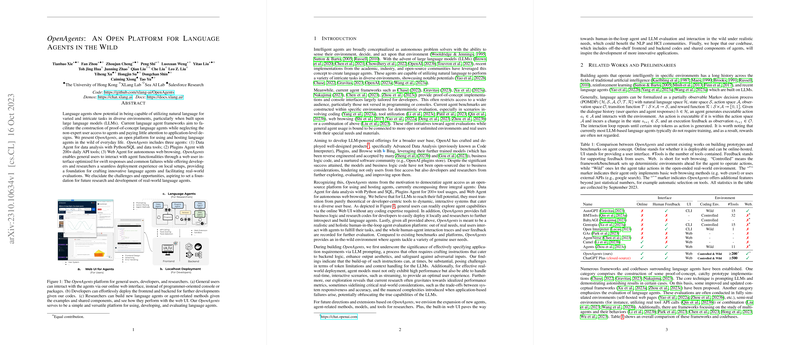OpenAgents: An Open Platform for Language Agents
The paper introduces OpenAgents, an open-source platform designed to enhance the accessibility and practicality of language agents in real-world applications. This work addresses the limitations of current agent frameworks by prioritizing user accessibility and comprehensive application-level designs. OpenAgents encapsulates three central agents: Data Agent, Plugins Agent, and Web Agent, each tailored to different domains, thereby offering a broad spectrum of functionalities.
Key Components and Technical Implementation
- Data Agent: Integrated for data analysis tasks, this agent supports Python and SQL environments while incorporating several data tools such as Kaggle Data Search and ECharts for interactive visualization. This enhances its capability to handle diverse data-centric requests effectively.
- Plugins Agent: This component integrates over 200 plugins for various functions like shopping, weather forecasting, and more. An innovative automatic tool selection feature allows this agent to identify the most applicable plugins based on user instructions, streamlining the process and increasing efficiency.
- Web Agent: Designed for autonomous web browsing, this agent can seamlessly interact with the user's browser through a Chrome extension. It allows for real-time navigation and task execution, providing an adaptive response to complex inquiries.
Implementation Challenges and Solutions
- User Interface Adaptability: The platform utilizes an Adaptive User Interface, ensuring that interactions are intuitive and efficient. This is crucial for bridging the interaction gap between the user and the system, especially when diverse datasets or complex task requirements are involved.
- Data Management and System Robustness: OpenAgents employs a multi-tier data storage strategy, using in-memory storage, Redis, and MongoDB to manage different data types effectively. Further, it incorporates mechanisms for error handling, prompt response generation, and token overflow management, enhancing reliability.
- Executable Environments: An integral feature is the ability to execute code within sandbox environments, allowing for secure and robust processing of tasks. This includes API interactions and web manipulations, which are central to the functioning of the Plugins and Web Agents.
Implications and Future Prospects
The introduction of OpenAgents signifies a step towards democratizing access to robust LLMs and agent technologies. By enabling real-world agent evaluations and providing an open-source foundation, the platform fosters innovation in the development and deployment of language agents.
For future application, researchers can build upon OpenAgents to enhance adaptive UI systems, improve human-LM interactions, and expand tool integration, thereby creating more sophisticated and user-friendly agent applications. The platform also serves as a testbed for evaluating LLMs under realistic conditions, propelling advancements in in-the-wild assessments.
In conclusion, OpenAgents represents a comprehensive effort to integrate LLM capabilities into practical agent applications, highlighting the importance of accessible, user-oriented design in AI research and development. As a foundational platform, it encourages the exploration of new applications and methods, furthering the potential of language agents in various domains.
